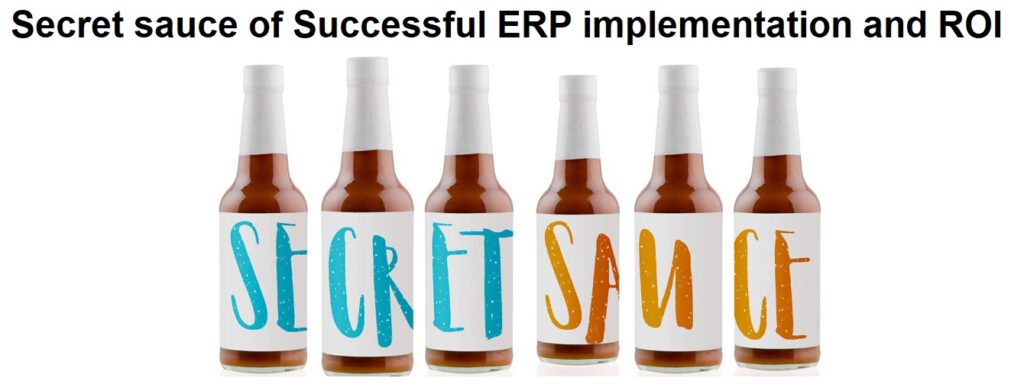
Webinar on:
Topic: “The Secret sauce of Successful ERP implementation and ROI”
Date: 24/01/2023
Time: 3.30 – 4.45 PM
Whom to attend: If you are a head or leader of manufacturing industry, this knowledge and tips will be extremely helpful.
With our collective expertise of over 150 manufacturing industry ERP implementations, we wish to host a webinar. This webinar will be very useful for companies looking for new ERP implementation or already implementing/already implemented the ERP system.
ERP is not complex. But when you don’t choose the right one & follow right steps, then it will be.
Manufacturing ERP projects usually get complex because of 3 reasons.
1. This almost involves all white collared folks and even a few blue collared ones of the organization from all departments. Added to this there are external ERP consultants. Naturally, when more people come together, there are more challenges.
2. Integrating the interdepartmental business process with zero redundancy and statutory requirements. This gets a lot more complex when the right system is not selected.
3. When the cost and time overrun, people get exhausted, and either choose to abandon the implementation or settle down to use limited features of the ERP system.
A successful ERP implementation has to take these 3 aspects into serious consideration. Only then the project can go through smoothly. Let’s see the secret sauce of this.
1. Industry-ready system: This actually means when the users are exposed to the system, they have to feel that what they are doing on a daily basis is all well covered in the system. Importantly the system has to confirm that they do not need anything more than what it offers.
2. Waterflow configuration & implementation method: This requires a clear understanding of the business requirements of the end user organisation and configuring the system as per that. This process has to minimise or avoid back-and-forth discussions on each & every single process or activity. This is where much friction starts if not done correctly.
3. ERP deployment models: Enterprises can choose either Cloud or On-Premise model based on cost and comfort. However, important point is the server availability and upkeeping of the IT infrastructure to ensure success of the ERP project. From the availability & security standpoint, the Cloud option is more advisable.
4. Project management: Almost 64% of ERP projects fail due to a lack of proper project management and follow-up. A daily follow-up is very important. A dedicated & experienced resource for this position is most recomended. At a crucial go-live phase, even we may need hourly follow-up. Random review meetings when there are delays will never help the project. Followup, followup, and followup, and there is no better substitute for this. More importantly, the top management has to jump in to address and discuss the delays, however small this could be to empower the project management function.
5. Master Data and the opening balances: The initial data collection and migration have to be more clear & comprehensive in order to reduce the effort to take off in the system.
6. End-user training and user acceptance: Each and every use-case of the transactions from start to end have to be validated by the user groups. For many of the use cases, it involves multiple departmental teams to provide their acceptance. Teams need to spend quality time during this phase. This will be very helpful and smooth during the go-live phase.
7. Go-live: This is crucial and has to happen within a given time frame to ensure the real-time data is being entered into the system. Go live also includes all verification of the transaction data and statutory reports with the legacy system.
8. MIS (Management information) and DSS (Decision support): This is the point at which ERP will yield the ROI, when the enterprise-wide system-based control and decision-making happen through the ERP system. This is the point at which people will start relying on ERP data.
9. Master Data management: This is very important to ensure data integrity. Many of the ERP projects after best efforts of implementation, due to lack of MDM will throw the project out of gear after 4 or 5 years of time. It is important to devise a fool-proof system before adding any new master records to the ERP system.
10. Ongoing support and enhancements: The ERP vendor has to have the vision to provide regular support, bugfix, and bring out enhancements, meeting growing business needs and statutory laws changes from time to time.
Note: Still you have time go live from 01/04/2023 in case if you are thinking for a new ERP system !

I’m a manufacturer of Ayurvedic Medicines and cosmetic products
ERP need for MSME’s
Syscon offers excellent product and service